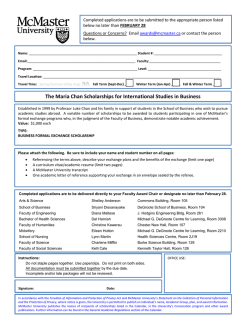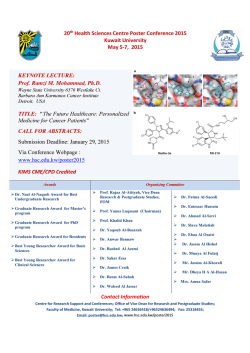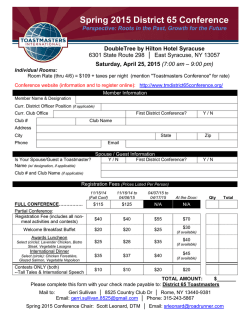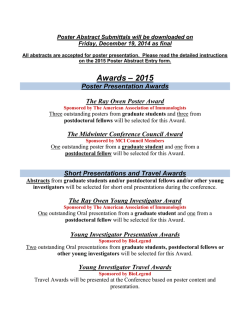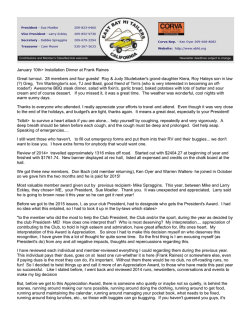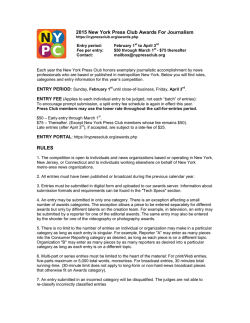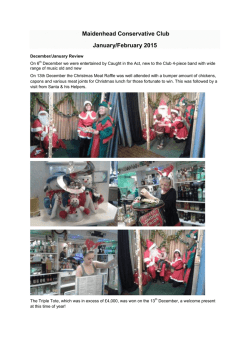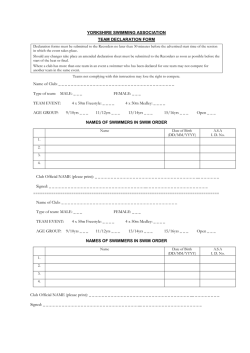
New Member Information Packet (PDF)
THE 3905 CENTURY CLUB, INC. GENERAL CLUB INFORMATION, BASIC NET PROCEDURES & SCHEDULES Welcome to The 3905 Century Club (Club) nets. The 3905CC was founded February 7, 1977, and after almost 38 years of continuous operation our club continues to meet our goal of running the premier Worked All States, DX, and Awards nets on the amateur bands. The purpose of the Club is to provide amateurs interested in Worked All States, or other awards, with organized nets populated with like-minded amateurs for making the necessary contacts and receiving the necessary QSLs. We also have our own extensive awards program, which goes well beyond just WAS awards, as well as our own QSL bureaus, all described in the following pages. We have basic information for DX stations on our web site at http://www.3905ccn.com/newsite/dxinfo.htm . Please contact the Webmaster if you can provide new or improved translations. The primary goal of our nets is to make contacts and exchange QSL cards. The exchange of QSLs for contacts made on our nets is an obligation and a requirement of participation in our nets. QSLs you receive may be used toward a number of very nice Club awards or toward any purpose you may choose. We operate awards nets on the 20, 40, 75/80 and 160m bands with a mixture of SSB, CW, RTTY and PSK31 modes. A detailed net schedule is shown on page 8 and on our Club web site at http://www.3905ccn.com/ (all lower case). Some nets are seasonal and some starting times may vary with Daylight/Standard time changes. Listen to the nets, subscribe to the Club mailing lists on Yahoo! (info below), or consult the Net Schedule on our web site for the latest net schedule information. Earning your first 100-Point Award certificate on any band/mode earns permanent voting membership in the Club and also makes you eligible to earn other awards on that same band and mode. You can go on to earn additional 100-Point Award certificates on other bands and modes and there are also many other fine certificate awards that are fun to work toward and are suitable for framed display in your “shack.” Awards applications and all other Club documents may be downloaded from the Club website. For those without Internet access, details for obtaining documents at cost by postal mail may be found on page 5. HOW OUR NETS WORK – At the start of a net, the Net Control Station (NCS) will call the net to order, make a few announcements and then will begin taking check-ins by call area starting with DX (non-USA) and then starting with the USA call area that corresponds with the last digit of the UTC date and proceeding thru all USA call areas. Your area is where you’re physically located when you check in, not the area corresponding to the number in your call sign. Some stations may check in as "no relay," meaning they don't want help with any aspect of making a contact – none at all. After taking check-ins, NCS will run thru the list allowing each station time for one call, occasionally more, to any other station on the net. The objective is to call a station you want a QSL from, exchange a signal report and confirm the actual signal report you receive so other stations on the net hear your confirmation. NCS will hear the exchange and will declare a contact valid if the reports are confirmed correctly. NCS will run thru the check-in list repeatedly, allowing each station checked in a call on each pass thru the list, occasionally taking additional check-ins, until net time expires or no one wants to make any more calls. Due to propagation, QRM, QRN, etc., it’s up to NCS to decide when to terminate repeated attempts to make a difficult call. If a call can’t be completed, another call is allowed. Your options on your turn – other than making a call – are to "go up for grabs" or to "take a pass." "Up for grabs" is an invitation to any station(s) to call you and you select from the pileup. “Take a pass” generally means you give up your turn to make a call during the current round. Rather than "take a pass" you should seriously consider going “up for grabs” so others wanting a contact with you have a chance to make one. It’s not required, but making and providing contacts is really why we’re all here. NET CHECK-IN LISTS – It’s advisable to make a list of stations, the states they’re in, signal strengths, any special status, etc., as they check in so you know who is on the net and who you want to call when your turns come. A volunteer usually (not always) posts check-in lists to the Yahoo! 3905checkins mailing list (described later) shortly after NCS starts allowing calls, but being voluntary this is not 100% certain. Live logging software is available to greatly simplify the list-making process. See “N7XG Logger” at http://www.alpinesoft.com/. DO NOT TUNE UP ON OR NEAR THE NET FREQUENCY OR NEAR OTHER ONGOING QSOS! DO NOT ENGAGE IN IDLE CHATTER AND BREAKS DURING THE NETS! DO NOT VOLUNTEER TO RELAY IF YOU DON'T HEAR CLEARLY! DO NOT RELAY UNLESS REQUESTED TO DO SO BY NCS! DO NOT ASSIST "NO RELAY" STATIONS IN ANY WAY! DO NOT ATTEMPT TO POLICE THE FREQUENCY! New Member Basic Info Packet Page 1 of 8 Rev 02/05/2015 Like most nets, we expect to receive some deliberate QRM. It’s Club policy not to give recognition of any sort to QRM and that no one may leave the net frequency to chase away nearby QRM. This is not good amateur practice and stations doing either may be asked to leave the net. You may respond politely to a query such as “Is this frequency in use,” especially if it appears the question will go unanswered otherwise, but it’s best to allow NCS to do this if NCS hears the query. While the information above should be adequate to get you started, additional information on the detailed workings of our nets is contained in a Net Control Guide available on the Club website or by postal mail. This is a good document to read over, along with the corresponding NCS Study Guide, and both are required reading if you’d like to become an NCS yourself. QSLing is VERY IMPORTANT to us… The exchange of QSLs for every contact – unless agreed otherwise at time of contact – is an obligation and a requirement of participation in our nets. Do NOT wait to receive a card before you send one. If everyone did that then no one would ever get a card. HOW OUR QSL BUREAUS WORK – The Club operates QSL bureaus at cost and the vast majority of stations on our nets use these bureaus because they’re by far the easiest and most economical way to exchange QSLs and they have a very fast turnaround. Cards are sorted promptly – usually daily – and mailed to you as soon as one of your envelopes is full. Our QSL Bureau Managers offer envelope plans at very attractive rates vs the cost of material and postage to send in your own (#10 or 6x9 only), but if you wish to provide your own, place 1 or 2 ounces of postage, no more, on each SASE (self addressed stamped envelope) you send, also placing your call sign on each in large, bold letters in the upper left corner for filing purposes, and send them to the appropriate QSL Bureau Manager(s). On any SASEs you send, PLEASE use the "forever stamp" for the first ounce. Also realize that the second ounce is only an additional $0.21, and that more than 2 oz of postage on a #10 envelope is wasted because it risks exceeding the thickness allowed for 1st class letters by the USPS. A list of our QSL Bureau Managers is on page 7 and their very economical envelope plans are also described there as well as on our web site. Since new participants usually make a large number of contacts initially, you should start with the equivalent of about 10 envelopes. As you receive them back filled with cards, you can send funds (via check mailed to the bureau, or via PayPal thru the individual QSL Bureau web pages on our web site) to replenish your envelopes (or you can send actual stamped SASEs) to match the rate of contacts you make on the nets. Using our bureaus allows you to use one stamp to send 10 - 15 cards to the bureau for distribution to others who also use our bureaus. In turn you’ll usually get back about the same in your envelopes from the bureau. Using our bureaus provides a 10X – 15X postage cost savings over sending QSLs directly plus it’s both fast and reliable. Not using our bureaus creates a significant unnecessary added expense (10X – 15X the cost of using the bureaus) for both you and those you contact. Stations preferring the direct QSL route are said to be “direct” and they are asked to announce this status to NCS whenever checking into a net. Stations with envelopes in our bureau(s) are said to be “good in the bureau” (GIB) or “via bureau.” Most use the bureaus because of the economy involved and most are very reluctant to QSL directly due to the cost. At an absolute minimum – unless otherwise agreed at time of contact – all stations, including those that are "direct," are expected to initiate QSLs promptly for all contacts they have initiated, and respond – without requiring an SASE – to all QSLs they receive. It’s really best to just go ahead and promptly initiate QSLs for all contacts you make no matter who initiated the call rather than waiting – and use our bureaus to do so. Exceptions are those logged in as "No Card Needed" and mobiles. "No Card Needed" stations do not want a card from you. Mobiles are generally an exception because they are usually unable to log their contacts while driving. You should plan to initiate a card to any mobile you contact (via bureau unless specified otherwise) with both signal reports, the state they were in, and any other relevant contact info on the card you send and let them respond to your QSL when they return home. You must initiate cards to Handihams via our Handiham bureau since our Handiham bureau manager uses the info from your card to prepare your return QSL. If you don’t initiate a QSL to a Handiham you probably won’t get one yourself. Remaining "direct" or requiring an SASE from others before sending a QSL will VERY SIGNIFICANTLY REDUCE THE NUMBER OF CALLS AND QSLS YOU WILL RECEIVE due to the 10X – 15X higher cost of QSLing direct (20X – 30X if a SASE is required). Remaining "direct" is simply not a logical choice for those planning on continued participation on our nets. About eQSLs & ARRL LOTW – eQSLs are acceptable for use toward Club awards; however most members do not use eQSLs or even have an eQSL account so sending only an eQSL is not an acceptable QSL practice unless both stations involved agree that it’s acceptable. If you want to use eQSLs, it’s best to confirm this with each station you contact. If you do eQSL, DO NOT include /M or /P as part of the call sign you contacted unless requested to do so; include those and all other extra info as part of the COMMENTS. Place both signal reports in the RST box; i.e., S59 R59. See also "Proper Completion of QSL Cards" below. ARRL LOTW is not acceptable for use toward Club awards. New Member Basic Info Packet Page 2 of 8 Rev 02/05/2015 PROPER COMPLETION OF QSL CARDS – our extensive awards program requires that a wide variety of information be included on all QSL cards so they can be applied toward awards with widely varying contact requirements. Any given QSL card may be used to qualify for a number of different awards, so full and complete information is important. First and foremost, your QSL card should be standard sized, 3.5" x 5.5", preferably on at least 67 lb stock. This assures your cards will fit the envelopes in the bureau and will be easy to handle. Your QSL should contain both call signs, your location (state and city), the UTC date and time with the date in an unambiguous format such as 05-Feb-2015. Also the frequency. For DX working split, list either both frequencies or the band used. If you list only one frequency it may be a frequency that is illegal for one of you to work on, making the QSL card containing that information useless. Include the mode (CW, PSK, RTTY, SSB), both signal reports, indicate if you were mobile or portable and in which state (or other location), indicate if the other station was mobile or portable and in what state, list any Club award certificates you hold along with their numbers and on which nets, indicate if you are a Club Officer, a YL, working as part of a “combo” (see below), whether you or the other station were operating QRP, any Club offices held, and any other status that may be worth points toward awards such as acting as NCS, location in a state or provincial capital, located in a National Park, etc. The majority of clubs that operate on our nets as well as nearly all 1x1 call signs DO NOT want a card from your station. If you are sending a card to a club or 1x1 call that wants a card, PLEASE make sure to note the OPERATOR'S call sign on the card – a simple note such as "Op: AB1CDE" is sufficient – otherwise the QSL will be returned to you as undeliverable. It’s very helpful, but not absolutely required, that you indicate the name of the net on which the contact was made; for example, “75M SSB Late Net” or “75M SSB LN.” All of this information plays a role in earning one or more of the many awards we offer and since we do not accept altered QSLs, all needed information must be written on the card by the sender of the QSL. A "combo" is two immediate family members checked into the same net session and operating from the same QTH, and having one of the following relationships: Husband–Wife, Parent–Child, Grandparent–Grandchild, Sibling–Sibling. The Club has a website at http://www.3905ccn.com with information on all facets of the Club, including all awards applications, images of awards certificates, a general FAQ, net schedules, and much, much more. There are three reflectors (mailing lists) hosted by Yahoo! with over 1,800 combined membership – 3905checkins is strictly for lists of check-ins to our nets and for real-time net-related topics; 3905chatgp is for general Club and amateur related topics plus “having fun” as that term is understood by reasonable people; and 3905awdtalk is for discussion and questions about existing awards, ideas for new awards and our awards program in general. To subscribe to any or all, go to our Club website and click on the appropriate sign-up link below the web site menu or sign up directly thru Yahoo! Groups. These reflectors don’t accept email attachments so they’re virus-free. The reflectors are run by an independent volunteer and are neither owned, sponsored, supervised, nor officially sanctioned by the Club. We have Club call signs – K4CCN in the USA and VE4CCN in Canada. Club members may apply to use the Club call sign for the country for which they’re licensed by contacting the trustee of the call sign. Neither call is available for use off Club nets. The call sign trustees appear in the list of Club officers beginning on page 6 below. WE HAVE A NEWSLETTER! The Centurion is published 4 times yearly and is a wealth of interesting information about Club current events and its members. The Centurion typically runs about 20 – 30 pages, 8.5”x11”, and contains Club news, recent awards winners, member profiles, net and awards information, and occasional articles ranging from mushing dogsled-mobile thru Alaska to retracing old Route 66, complete with high quality color photos. Our members make up a unique and fascinating segment of hamdom and have built up a treasure trove of stories to tell over the 38-year history of our Club and you can read it all in The Centurion. The Centurion is free thru our web site (PDF format). The 5-issue hardcopy rate within the USA, delivered by postal mail, is $15. You can pay for a subscription using PayPal by visiting our Club website or mail a check to the editor whose address appears in a listing of Club officers below. A number of back issues are available on the Club web site. OUR AWARDS PROGRAM is quite extensive and is well described on our Club web site and briefly here. To get started on the Club awards, and on your way to becoming a Club member, an application for the 100-Point Certificate is usually included with postal mailed copies of this information packet. This is our most basic award, which must be applied for before any other awards can be issued. You may apply for the initial 100-Point Award and advanced awards for the same net (band/mode) at the same time. This award also confers lifetime voting membership and a permanent record of your achievement on the Club web site. Shortwave Listeners (SWLs) may participate in our nets and must earn the Shortwave Listener Award before earning other awards. Details are in the SWL Award application document. New Member Basic Info Packet Page 3 of 8 Rev 02/05/2015 Your very first 100-Point award earned using your personal call sign is free. The fee for all other certificate awards is $5 (USD), or $4 (USD) for those disabled or age 65 or older. Some awards offer endorsements. Single endorsements are $3, and you should refer to our web site or to the 100-Point Award or SWL Award documents for details on lower pricing for multiple endorsements to the same award applied for at the same time. Because of possible changes, you are advised to ALWAYS make sure your Area Awards Manager hasn't changed before mailing in new applications. The Area Awards Managers are listed on page 6 below and detailed directions for submission of applications are in the PDF versions of the 100-Point Award and SWL Award applications and on the Club web site. Please read one or the other of these documents for the procedure for submitting awards and for the award fee structure. If you plan to pursue additional Progressive (points) Awards beyond the 100-Point Award, you should obtain the applications for the 500-Point, 1000-Point and Worked All States awards now so you can adopt the best QSL use strategy – which is outlined in the 500 and 1000-Point Award applications. IMPORTANT: All contacts for all Club awards must be made on Club nets and all contacts for an award must come from the same band and mode unless otherwise noted in the requirements for each award. Detailed requirements for each award are listed only in the PDF versions of the applications found on our club web site and reading the detailed requirements is usually essential to proper completion of an application form. The Word and Excel versions found on our web site are application forms only (no detailed requirements) and not all awards applications are available in Excel format. You should make a copy of each application form to use as a worksheet while working toward an award and then fill out the original when finally applying. Legibility is very important when applying for awards! The Word and Excel templates may be filled out on a computer, saved, printed, etc. Copies of applications requested via postal mail will be printed from the full PDF versions. Be sure you keep a copy of all awards applications you submit. We cannot guarantee that a copy can be provided to you at a later date and availability of all past Progressive Awards is required for processing higher level Progressive Awards on the same band/mode. The 3905CC Eyeball is an annual get-together of our members that’s usually hosted in a different area – west, middle, east – of the USA each year. It’s usually held mid-late July, but it can take place as early as late June. It's always held after elementary and secondary schools (K – 12th grade) break for the summer. The Eyeball features an opportunity to meet some of the people you contact on our nets, a group dinner and group picture, stations set up for operation by members on local QRP nets as well as our regular nets, a "Mobile Shootout” to determine who has the biggest mobile signal, great door prizes, and more. Our 2013 Annual Eyeball was held in Torrington, WY, June 28th – 29th; Eyeball 2014 was held in De Pere (Green Bay), WI July 17th – 19th; and Eyeball 2015 will be held in Nashville, TN, June 18th – 20th. Visit our Club web site or contact our Eyeball Coordinator (see officer listing below) for additional information. The Club’s eleven Area Directors (ten US call areas and DX) are responsible for setting the policies and rules for the Club. Your Area Director is your representative on our Board of Directors. Please feel free to contact the Director for your call area with your comments, suggestions, and thanks for his or her efforts. Your call area is the area you live in, regardless of the number in your call sign. Please remember that these hard-working individuals are unpaid volunteers. In fact, all Club officers, appointees, NCS stations, etc., are unpaid volunteers. You can become one too, just ask us how. 73 de… Jim Higgins, KB3PU 210 Mallard Dr Sumter, SC 29150-3181 Email: info (at) 3905ccn dot com New Member Basic Info Packet Page 4 of 8 Rev 02/05/2015 LIST OF AVAILABLE DOCUMENTS & AWARDS APPLICATIONS (THE NUMBERS IN PARENTHESES AFTER EACH ITEM, LIKE (2/3), SHOW THE SHEET AND PRINTED SIDE COUNT) 100-Point Award – The most basic award that must be earned before any other awards can be issued. (3/5) 500-Point Award – Requires an additional 400 points on top of the basic 100-Point Certificate. (2/3) 1000-Point Award – Requires an additional 500 points beyond the 500-Point Award. (2/4) 2000-Point Award – This award requires repeating the 100, 500 and 1000-point awards except with all new call signs. (3/6) 12-Month Sequence (Annual) Award – Work specific numbers of contacts in various categories in order. Mixed nets. (2/4) 3905 (Annual) Roundup Award – Work mixed nets for contacts totaling exactly 3,905 points. (2/3) Alphabet Soup Award – For working all 26 letters of the alphabet using only the second letter of the call prefix. (1/2) Baker’s Dozen Award – For working the same mobile station in 13 different states/provinces. (1/2) Baker’s Dozen Dozen Award – For those holding 13 Baker's Dozen Awards. (1/2) Beat the Clock (Annual) Award – Work contact quantities related to 24 hours, 7 days, 4 weeks, 12 months. (1/2) Canadian Call Area Award – Requires multiple contacts with all call areas on two bands. (2/3) US Call Area Award – Requires contact with multiple states in all call areas on two bands. (2/3) Prefix Award – For working 300 different call sign prefixes. (Endorsements for each additional 100 prefixes.) (3/5) Certificate Hunter’s Award – For working 100 100-Point certificate holders, endorsements for each additional 100. (1/2) Chain Letter Award – For working alphabetically ordered letter pairs in call signs. (1/2) Clint Wise Memorial Award – For mobile/portable operators for 5 contacts made from 20 different states. (2/4) Club Officers Award – For contacts made with Club Officers. (1/2) Crossword Puzzle Award – For contacts with call signs that fill in "crossword puzzles." (2/3) Dictionary Award – For forming words from letters found in contacted call signs. (2/4) Double Vision Award – For contacts with call signs having consecutive doubled letters. (1/2) DX Award – For contacts with 25 different DX entities. Endorsements for each additional 25. (1/2) Journeyman Award – Requires 500 points, cross-band. (1/2) Master’s Degree Award – A complex, challenging, but rewarding award, based on contacts, service, and participation. (2/3) Millennium Award – For working 100 100-Point certificate holders with certificate numbers ending in 00 – 99. (2/3) National Parks Award – For contacts made from, or with stations located in, US, Canadian and/or DX National Parks. (3/5) NCS Awards – Requirements only, no application – awarded on the basis of net records. (2/4) Net Control Operator Certificate – awarded for passing a test to become an NCS station. Nite Owl Award – For contacts made on Late Nets only. (1/2) Nomad Award – For contacts made from multiple states while mobile. (1/2) Number Racket Award – For working 50 1000-point certificate holders and 25 2000-point certificate holders. (1/2) Pick 30 (30th Anniv) Award – Make 30 contacts with a list of contact categories. (multi-band) (2/4) Poker Player Award – Build poker hands using prefixes/suffixes (ranks) and call areas (suits). (Very challenging!) (2/4) Quarter Master Awa4rd – For working 25 Master's Degree Holders. Endorsements every 25. (1/2) Reginald Fessenden Award – For contacts made from each of 9 different provinces/territories while mobile or portable. (2/3) Roaming Master Award – For contacts made by and with holders of the Master's Degree Award while mobile or portable (2/3) Route 66 Annual Challenge Award – Work contacts in lots of 6 & 16 totaling 132 - a round trip on Route 66. (mixed nets) (2/4) Shortwave Listener (SWL) Award – Basic Award for SWLs. SWLs may go on to earn most other awards. (2/4) Solar System (Annual) Award – Spell names of Solar System objects from letters in call signs. Mode specific. (2/4) Triple Play Award – For confirming contacts made with 30 different operators on 3 different bands or 3 different modes. (1/2) Work 30 (30th Anniv) Award – Make 30 contacts with different US states, Canadian Prov/Terr or DX. (mixed nets) (1/2) Worked All Canada Awards & Worked All Canada Same Mobile Award – For working all 13 Canadian provinces & territories; many specialty variations, some involving working as few as 9 provinces and territories. (2/3) Worked All Century Club Nets Award – For working 5 certificate-holding stations on each of the Club’s nets. (1/2) Worked All States & Worked All States Same Mobile Award – For working all 50 states; there are many interesting and challenging specialty variation to this award, some involving working as few as 35 states. (2/3) Club Constitution (2/4) Club Bylaws (9/17) NCS Guide (6/12) NCS Study Guide (6/12) All documents are available (PDF) on our web site & a free PDF reader is available at http://get.adobe.com/reader/. Those without Internet access may obtain info by mail, laser printed 2-sided on 20# paper at a cost of $0.06 per side printed, plus postage to your location from ZIP Code 29150 (South Carolina) – I supply the envelopes. Add up the sides printed & multiply by $0.06 to get the material cost, then add up all sheets & assume 1 oz per 5 sheets when figuring postage. Actual postage will be based on actual weight & any excess postage will be returned as cash and/or US stamps. I DON’T mail coins because they tear envelopes and I DON’T mail "postage due," so send plenty of postage (stamps) to avoid delays. Excess postage will be returned. Payment for pages must be in US Dollars, cash or check drawn on a US bank made out to “Jim Higgins.” You may send US stamps for postage – and I prefer that you do because it's so easy to return any excess – but NOT to cover printing costs. Please minimize your chances of problems by wrapping any cash (sent at your risk) so it can’t be seen thru the envelope & by NOT sending any SASEs or coins. Please be sure to include (neatly printed) your name, call sign, complete mailing address, phone number, and a very clear and very specific listing of exactly what you want. (See list above.) You may obtain a data CD containing all documents above, sample images of most award certificates, and more, for a total cost of $3.00 (USD) mailed in a proper CD mailer anywhere in the USA, Canada or Mexico, elsewhere $4.00 (USD). If you have a friend who can print documents for you, the CD may be your best choice. Or if that friend has Internet access, all documents may be printed for free from our web site. New Member Basic Info Packet Page 5 of 8 Rev 02/05/2015 THE 3905 CENTURY CLUB, INC. CLUB OFFICERS (FY 2015 CHANGES IN RED) PRESIDENT VICE-PRESIDENT BOARD CHAIRMAN SECRETARY TREASURER CLUB RECORDER AWARDS SECRETARY EYEBALL COORDINATOR 2015 INFORMATION OFFICER REGISTERED AGENT CENTURION EDITOR HISTORIAN WEB MASTER PUBLIC RELATIONS OFFICER SPECIAL ASST to BOARD SPECIAL ASST to BOARD NCS TRAINING OFFICER CENTURY CLUB CARES CHMN TRUSTEE – K4CCN Club Call TRUSTEE – VE4CCN Club Call W2UJ N7XG W6LJK W9OO K3BOB KB3PU W3BS WU8I KB3PU W4JBZ KT4CB AA0ZP KB3PU WU2T WB2RWT NJ3V N9PYR KL7QW N2XTT VE4ABU Russ Sawyer, 1362 Route 9W, Selkirk, NY 12158-1718 Dean Davis, 3596 Karen Ave S, Salem, OR 97302-5620 George Huett, W6LJK, 426 S Valley St, Anaheim, CA 92804-2436 Carl E. Durnavich, 417 Calumet Blvd, Harvey, IL 60426-1205 Bob Hibbert, 104 Farmstead Ln, State College, PA 16803-3337 Jim Higgins, 210 Mallard Dr, Sumter, SC 29150-3181 Buddy Spiegel, 3014 Grand Fields Ln, Memphis, TN 38119-9021 Pat Caldwell, 110 Phillip Dr, Springfield, TN 37172-5039 Jim Higgins, 210 Mallard Dr, Sumter, SC 29150-3181 James M. Johnson, 10144 Seagrape Way, Palm Beach Gardens, FL 33418-4528 John Spillman, 168 Bosley Drive Ext, Stanley, VA 22851-4105 Frank Taylor, 1413 Saint Joachin Ct, Bellevue, NE 68005-4937 Jim Higgins, 210 Mallard Dr, Sumter, SC 29150-3181 John Kirkpatrick, 351 Old Georgia Rd, Moore, SC 29369-9322 Gladys Zickler, 762 Duanesburg Rd, Schenectady, NY 12306-1032 (Permanent VIP) John O’Keeffe, RR 2 Box 2890, Brackney, PA 18812-9607 (Permanent VIP) David Paradise Jr, 9561 Nicholson Rd, Oak Creek, WI 53154-5212 Dave Meye, PO Box 224, Lake Ozark, MO 65049-0224 Peter Summers, 72 Cedar Grove Rd, Little Falls, NJ 07424-1719 Al Rowe, 754 Pepperloaf Cres, Winnipeg, MB, Canada R3R 1G3 Trustees for Club Calls are not considered valid for points toward the Club Officer’s Award. AREA DIRECTORS: 1 2 3 4 5 6 7 8 9 0 DX KC1AU N2XTT K3ATY KB3PU AG5T W6LJK AC7RA KJ8O WA9DIY WB0PYF VE3CMB Robert Wilson, 36 Water St, PO Box 121, Monson, ME 04464-0121 Peter Summers, 72 Cedar Grove Rd, Little Falls, NJ 07424-1719 Kathy Krajewski, 30 Tiverton Cir, Newark, DE 19702-1444 Jim Higgins, 210 Mallard Dr, Sumter, SC 29150-3181 Marty Blaise, AG5T, 8611 Twisting Vine Ln, Houston, TX 77040-4619 George Huett, W6LJK, 426 S Valley St, Anaheim, CA 92804-2436 Ricky Asper, 3815 S. 1915 E., Holladay, UT 84106-3850 Joe Miller, 6928 Forest Park Ct, Troy, MI 48098-1931 Jim Foster Sr, S37W27895 Sun Valley Cir, Waukesha, WI 53189-6110 Ray Myers, 204 Turf Ct, St Louis, MO 63119-4532 Craig McLoughlin, 2273 Samuel Dr, Ottawa, ON K1G 3C3 ALTERNATE AREA DIRECTORS: 1 2 3 4 5 6 7 8 9 0 DX N1RNJ K2UNI N3HWH K4CNM AE5XL AB6YL WB7ASC KD8HSV NJ9T W0YV VE4ABU Gary Sheridan, 862 Young Rd, Williamstown, VT 05679-4405 Keith Tilley, 2326 Lucas Turnpike, High Falls, NY 12440-5901 Wes Hammerschmidt Sr, 232 Bridge St, Collegeville, PA 12426 Clarence Meese, PO Box 2158, Manassas, VA 20108-0823 Larry Stout, 2414 Isabelle Dr, Copperas Cove, TX 76522-7591 Ginger Wonderling, 24425 Woolsey Canyon 145, Canoga Park, CA 91304-6825 Ron Seese, 21211 Sunwest Ave, Medical Lake, WA 99022-9690 Rob Gibbs, 151 Broadway Rd, Enon, OH 45323-1106 John (Pete) Thornton, 5308 Glen Elm Dr, Peoria Heights, IL 61616-5123 Tim O'Hara, 1110 W Main St, Robins, IA 52328-9798 Al Rowe, 754 Pepperloaf Cres, Winnipeg, MB, Canada R3R 1G3 AWARDS MANAGERS: (SEND AWARDS APPLICATIONS TO THE AREA AWARDS MANAGER FOR YOUR CALL AREA!) 1 2 3 4 5 6 7 8 9 0 DX KC1AU WA2JIM KC1AU AE4NT N5OHL N7JY K7QHU K8VGM KE9OI WC0PD VE3CMB Robert Wilson, 36 Water St, PO Box 121, Monson, ME 04464-0121 Clay Statmore, 49 Mountain Rd, Ledgewood, NJ 07852-9752 Robert Wilson, 36 Water St, PO Box 121, Monson, ME 04464-0121 Ben Goldfarb, 124 Woodmill Rd, Longwood, FL 32779-4964 Jim Richardson, 1810 NW 18th St, Oklahoma City, OK 73106-1817 John Bartholomew, 5582 Alfred Ave, Westminster, CA 92683-2808 Steve Davis, 3166 Lago Vista Dr, Melbourne, FL 32940-1407 Vicki Mate, 23281 Marion Rd, North Olmsted, OH 44070-1142 Dave Czerniak, 694 E 1100 N, Wheatfield, IN 46392-8398 Dean Monroe, 510 Cottonwood St, Emporia, KS 66801-3856 Craig McLoughlin, 2273 Samuel Dr, Ottawa, ON K1G 3C3 New Member Basic Info Packet Page 6 of 8 Rev 02/05/2015 NET COORDINATORS: CW NETS 20 CW 40 CW 80 CW 160 CW EARLY DIGITAL NETS 20 PSK 20 RTTY 40 PSK 40 RTTY 80 PSK 80 RTTY SSB NETS 40 SSB EARLY 40 SSB LATE 75 SSB EARLY 75 SSB EARLY ASST 75 SSB LATE 160 SSB EARLY 160 SSB EARLY ASST 160 SSB LATE WN1F WN1F AC7XF K9EA David Feeney, 1 Ridgeway Rd, Scarborough, ME 04074-8210 David Feeney, 1 Ridgeway Rd, Scarborough, ME 04074-8210 Hugh Mac Donald, POB 1822, Bandon, OR 97411-1822 Dan Michnay, 9406 Notestine Rd, Fort Wayne, IN 46835-9449 WN1F WN1F AD5XD AD5XD AD5XD AD5XD David Feeney, 1 Ridgeway Rd, Scarborough, ME 04074-8210 David Feeney, 1 Ridgeway Rd, Scarborough, ME 04074-8210 Milt Withers, 2323 Woodglen Dr, Richardson, TX 75082-4511 Milt Withers, 2323 Woodglen Dr, Richardson, TX 75082-4511 Milt Withers, 2323 Woodglen Dr, Richardson, TX 75082-4511 Milt Withers, 2323 Woodglen Dr, Richardson, TX 75082-4511 WF4H K5SRG K1EDG WU2T KG4ZOD WK7K K9ZK WU8Q Dwight Greenberg, 5320 Shadwell Ave, Cocoa, FL 32926-2194 Skip Guenter, K5SRG, PO Box 907, Hutto, TX 78634-0907 Ed Garrison Jr, 10 Garett Ave, Gray, ME 04039-7754 John Kirkpatrick, 351 Old Georgia Rd, Moore, SC 29369-9322 Donnie Hurst, Jr, 3211 Forestdale Dr, Burlington, NC 27215-4652 John Patrick, 11048 US Hwy 85, Torrington, WY 82240-7802 Phil McMillan, 9600 Wolf Rd, Geneseo, IL 61254-9039 J.R. Burgess, PO Box 512, Daniels, WV 25832-0512 QSL BUREAU MANAGERS: BUREAU CALL ALL 40m N7XG All 20m All 75m All 80m All 160m W2UJ Handiham QSL Mgr WM9H DX Bureau WB5FDP QSL BUREAU MANAGER NAME / ADDRESS / OTHER INFO Dean Davis, 3596 Karen Ave S, Salem, OR 97302-5620 Dean accepts #10 or 6 x 9 SASEs and also offers a plan consisting of 6 x 9 envelopes at $0.11 plus postage drawn from funds you deposit with Dean. Specify envelopes sent to you to contain 8, 16, or 24 cards when depositing funds. http://www.3905ccn.com/newsite/buro-40.htm . Russ Sawyer, 1362 Route 9W, Selkirk, NY 12158-1718 Russ accepts #10 or 6 x 9 SASEs and also offers a plan consisting of 6 x 9 envelopes at $0.11 plus postage drawn from funds you deposit with Russ. Specify envelopes sent to you to contain 8, 16, or 24 cards when depositing funds. http://www.3905ccn.com/newsite/buro-75.htm . Gene Schneider, 4472 S 44th St, Greenfield, WI 53220-3604 Gene accepts the usual SASEs or he will provide SASEs per the plans below. (just send him the money and your call sign, name and address and indicate the plan you want): Cash/Check PayPal . 1 Oz 2 Oz 1 Oz 2 Oz . Plan Ten 6 X 9 SASE: $6.30 $8.40 $6.80 $8.95 Ten #10 SASE: $5.80 $7.90 $6.30 $8.45 You can order by Paypal or Credit Card at http://www.3905ccn.com/newsite/buro-hh.htm Rick Mobley, 12 Ludington Cv, Little Rock, AR 72227-3855 See http://www.3905ccn.com/newsite/buro-dx.htm for use of this Bureau. No SASEs required. AWARDS COMMITTEE: KB3PU – Chair; W3BS, AC7RA, N2XTT, NA0L PRESIDENTIAL ADVISORY COMMITTEE: W5IL – Chair; AA0ZP, KK2M, K0HNM, N5OHL, W4JBZ, WB5FDP ORIGINAL CHARTER SIGNERS: PERMANENT VIPs) (BY CALL AREA) (SK) 1 AA1Q 2 WA2ZYM 3 KD3O 5 K5WSC 4 WD4CQY 6 K6ACX 7 WB7NSE 9 WA9KKM DX VE3IKN 8 WA8WZX 10 N0SD PAST PRESIDENTS: (IN ORDER SERVED) (SK) Charter President – W9HG (Permanent VIP) 2 WD4ROD 4 WA2ZYM 6 W4NNO 8 WI4Y 3 WA4SGP 5 KA5HFB 7 WD0GAH 9 KI5RN 10 AA0ZP 12 WK5S 14 NJ9T 11 AA1ME 13 WM4SG 15 WB5FDP MASTERS DEGREE HOLDERS: (SK) 1 2 3 4 5 6 7 8 9 AB6TX KC1NA W4NNO KI5RN W3QZ N2XTT KK2M W0MYZ KD8QQ 10 11 12 13 14 15 16 17 18 W5IL K7MFG AA0ZP N2OCW AK8R WQ1H W6BUM N5OHL WM0F 19 20 21 22 23 24 25 26 27 VE3OII WD4MXW K0HNM WB5FDP KM5MS NC4MO N0PUI N1NU NN5G 28 29 30 31 32 33 34 35 36 WU8Q KJ4JC KE4DYG NC4RS K5SVC AL7QQ N3YK NI7F N4UPX 37 38 39 40 41 42 43 44 45 K2CV NX7F W0OI WT0A K4NOP K5DWI N3WD KD8EZS WB1I 46 47 48 49 50 51 52 53 54 WV4EVR W8NET KD8JCO N7WH KC0MS AA3FC KI4WCQ VE4ABU K7MI 55 56 57 58 59 60 61 62 63 NJ9T AI3CD VE3CMB KE4VYN KD4POJ VE9DH W2UJ KG4ZOD W9OO 64 65 66 67 AC7RA KT4CB K3CD KI4DFS This document is maintained by Jim Higgins, KB3PU, Information Officer, 210 Mallard Drive, Sumter, SC 29150-3181 Email: Info (at) 3905ccn.com. If it’s sent by postal mail it usually includes a copy of the 100-Point Award Application. New Member Basic Info Packet Page 7 of 8 Rev 02/05/2015 3905 CENTURY CLUB (STANDARD TIME) NET SCHEDULE (ALL DAY & TIME REFERENCES ARE UTC, NOT LOCAL) (Updated 04-Dec-2014) Net schedules are only as accurate as the info supplied to the Webmaster by the Net Coordinators (RECENT CHANGES ARE IN RED) TIME (UTC) DAY (UTC) FREQ (MHz) NET REMARKS COORD (Days/Times below are UTC) SSB NETS DO NOT interfere with the YL System nets, which run Daily 7.2675 40m Early WF4H 0100 before our net!! Alt freq 7.2435 Daily 3.902 75m Early K1EDG Alternate frequency 3.898 0300 Daily 1.926 160m Early WK7K 0300 Daily 7.188 40m Late K5SRG Alternate frequencies 7.178 or 7.208 0500 Daily 3.902 75m Late KG4ZOD Alternate frequencies 3.897 or 3.895 0600 Daily 1.926 160m Late WU8Q NET INACTIVE 0600 0730 Sat 1.926 160m Late Late New Schedule Effective Feb 7th – NCS KB0EL CW NETS Sat 7.046 40m Late WN1F Slow Speed Net 0400 2000 Sun 14.053 20m WN1F 0400 Mon 3.5475 80m Late AC7XF Slow Speed Net. 0200 Tue 7.046 40m Early WN1F 0200 Fri 3.5475 80m Early AC7XF Slow Speed Net 0300 Fri 1.818 160m Early K9EA 2nd & 4th Friday UTC PSK31 NETS (USB, 1500Hz Mark Tone) 1900 Sat 14.0680 20m WN1F Wed 7.070 40m AD5XD 1st & 3rd Wed UTC 0300 Thu 3.572 80m AD5XD 1st & 3rd Thu UTC 0400 RTTY NETS (LSB, 2125Hz Mark Tone) 2100 Sat 14.084 20m WN1F Wed 7.084 40m AD5XD 2nd & 4th Wed UTC 0300 Thu 3.586 80m AD5XD 2nd & 4th Thu UTC 0400 SOME NETS DO NOT RUN AT REGULAR DAILY OR WEEKLY INTERVALS – SEE REMARKS FOR DETAILS NET In months with 31 days, the nets on the 31st (UTC) will start with a Question & Answer session. NONE OF THE ABOVE NETS WILL RUN WITHOUT AN NCS. PLEASE CONSIDER STEPPING UP TO RUN A NET IF THE NCS DOESN'T APPEAR AT THE SCHEDULED TIME. OTHERWISE THERE WILL BE NO NET. Net Control Stations will do their best to start the nets on the published frequencies, but all net frequencies are +/- QRM. Please tune to NCS – the NCS is never off frequency. NCS, not your frequency display, is where the net is. RTTY uses LSB or RTTY mode & AFSK tones of 2.125 kHz mark & 2.295 kHz space (170 Hz shift), 45 baud (60 wpm). If you use FSK, tune 2.125 kHz lower, zero beating the mark tone. If you use USB, invert your tones & tune 4.250 kHz lower. PSK31 uses USB and signals will be found at about 1,500 Hz offset in the waterfall display. Turn off AFC in your software. Set your frequency to the net frequency and then fine tune with your mouse and waterfall display. Do NOT use DSP, or adjust RIT or your VFO after you check in. BPSK modulation is recommended. All CW nets will slow down to your sending speed when contacting you so DO NOT send faster than you can receive. They may conduct housekeeping transmissions involving relay stations, at much faster speeds for the sake of efficiency. UTC DAY/TIME CONVERSION EDT EST/CDT CST/MDT MST/PDT PST/AKDT AKST/HADT HST/HAST (UTC – 4) (UTC – 5) (UTC – 6) (UTC – 7) (UTC – 8) (UTC – 9) (UTC – 10) 0001Z 2001 1901 1801 1701 1601 1501 1401 COLOR CODE: 0100Z 2100 2000 1900 1800 1700 1600 1500 0200Z 2200 2100 2000 1900 1800 1700 1600 0300Z 2300 2200 2100 2000 1900 1800 1700 0400Z 0000 2300 2200 2100 2000 1900 1800 0500Z 0100 0000 2300 2200 2100 2000 1900 0600Z 0200 0100 0000 2300 2200 2100 2000 LOCAL DAY IS DAY BEFORE UTC DAY 1900Z 1500 1400 1300 1200 1100 1000 0900 2000Z 1600 1500 1400 1300 1200 1100 1000 2100Z 1700 1600 1500 1400 1300 1200 1100 2200Z 1800 1700 1600 1500 1400 1300 1200 2330Z 1930 1830 1730 1630 1530 1430 1330 LOCAL DAY = UTC DAY Find the UTC time on the top row and then drop down to the line even with your time zone on the left to find your local time. If that places you in the pinkish section, then your local day is the day before the UTC day. New Member Basic Info Packet Page 8 of 8 Rev 02/05/2015
© Copyright 2026
